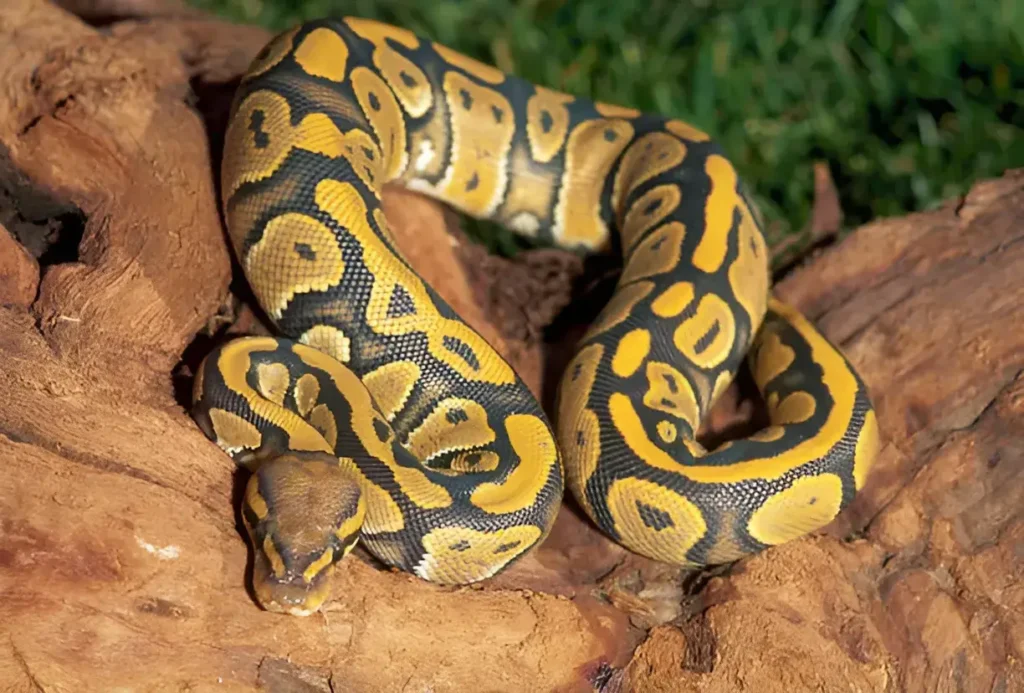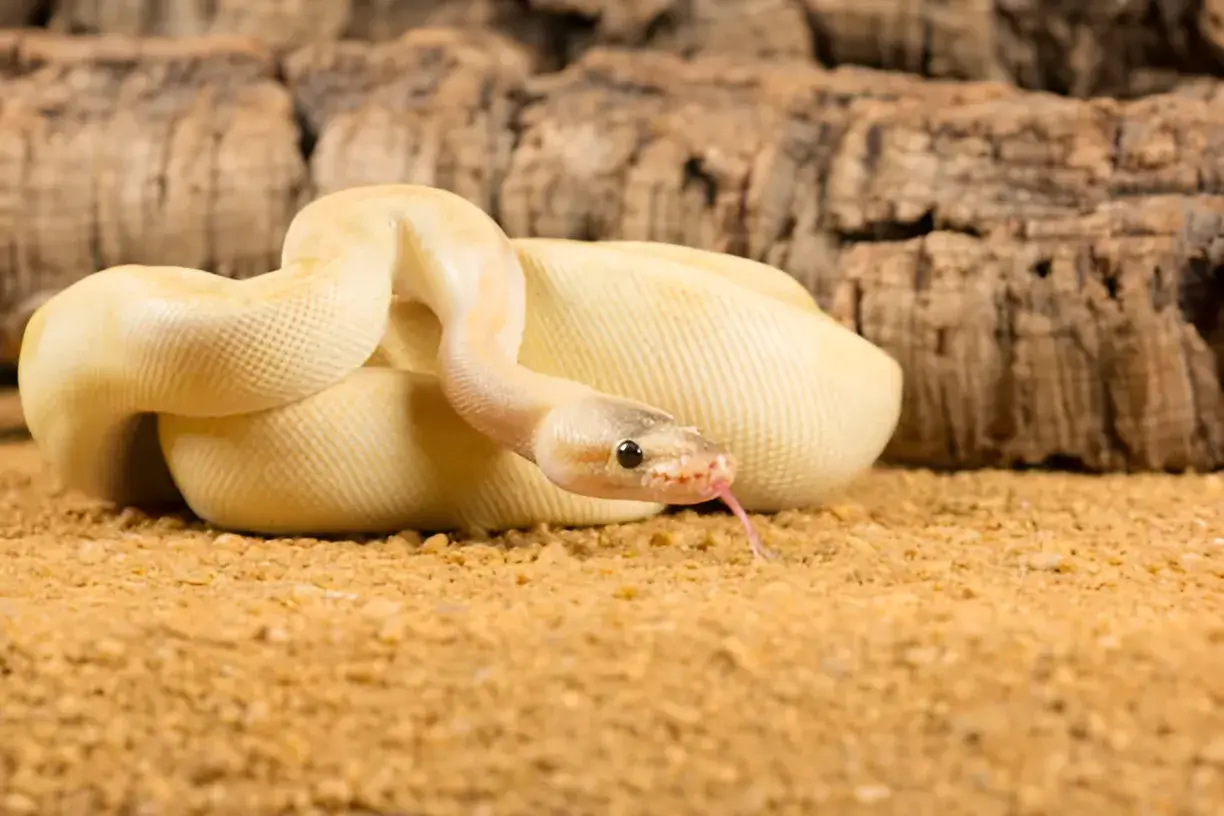Is your ball python refusing to eat? (or Why is my ball python not eating?) Don’t panic! Refusing food is a common issue for ball pythons, and the reasons can range from simple stress to a potential health concern. Let’s delve into the most frequent causes and how to get your snake back on track.
Understanding Your Ball Python’s Needs
Ball pythons are fascinating but sometimes finicky creatures. To encourage healthy eating habits, let’s look at the key elements of their environment and care:
Stress: The #1 Culprit: Changes in routine, a new enclosure, or too much handling can all create anxiety that suppresses appetite.
Perfect Temperatures: Aim for a hot spot of 88-92°F and a cool side around 76-80°F. Improper temperatures can affect both digestion and the desire to eat.
Humid Hideaway: Humidity should hover around 50-60%. Provide at least one hide box with damp sphagnum moss to aid with shedding and offer a sense of security.
Prey Preferences: Live or frozen-thawed? Mice or rats? Coloration can matter too – ball pythons can be surprisingly picky!
Troubleshooting Time: Why Won’t My Snake Eat?
Shedding Cycle: Look for cloudy eyes and bluish skin – appetite normally decreases pre-shed and resumes shortly after.
Breeding Season: Mature males especially may go off food when focused on finding a mate. This is a natural behavioral change.
Relocation Stress: If your snake is in a new home, give it time to adjust. Limit handling and offer plenty of cover within the enclosure.
Too Much…Everything: Overfeeding or overly large prey can make your snake uninterested in the next meal. Adjust timing and prey size.
Illness: If eating refusal is accompanied by lethargy, discharge, or breathing difficulties, a vet visit is essential.
Practical Tips to Entice Your Ball Python

Timing Matters: These snakes are crepuscular (most active at dawn/dusk), so try feeding around those times.
Warm it Up: Slightly warming the prey item can increase its scent appeal. Never use a microwave; a hot water bath is safe.
Brain the Prey: Only if using frozen-thawed, and for stubborn feeders. This can make it seem more appealing.
Switch it Up: Experiment with different prey types (e.g., rat instead of mouse) or a smaller size.
Patience is Key: Don’t panic if they miss a meal. Offer food again in a week. Force-feeding causes more stress.
Advanced Troubleshooting for Uncommon Scenarios
Parasites: While less frequent than stress-related eating issues, internal parasites can steal vital nutrients and affect your snake’s overall well-being. Look for unusual fecal matter, unexpected weight loss, and a generally listless demeanor. A veterinarian can accurately diagnose and treat any parasitic infestation.
Impaction: If your snake accidentally ingests some substrate or other material, this can lead to a digestive blockage. Signs might include a lack of interest in food, abdominal swelling, or noticeable discomfort when passing waste. Prompt veterinary attention is necessary for safe resolution.
Brumation Clues: Brumation is a natural process similar to hibernation in some reptiles. Your ball python might become less active, seek out cooler spots in its enclosure, and refuse food. Understanding these behavioral changes helps differentiate brumation from potential health concerns.
Beyond Food Refusal: Other Warning Signs
Sometimes food refusal is a piece of a larger health concern. Keep an eye out for these potential red flags, especially in conjunction with your snake not eating:
- Behavioral Changes: Excessive soaking, lethargy, hiding constantly, or aggression may indicate a problem.
- Breathing Difficulties: Open-mouth breathing, wheezing, or discharge from the nose are signs of potential respiratory issues.
- Skin and Eye Changes: Wrinkling, sunken eyes, blisters, or retained shed can be signs of illness or improper husbandry.
When to Seek Professional Help
If your ball python shows a prolonged refusal to eat (lasting more than several weeks), or if this is accompanied by any worrisome symptoms mentioned earlier, don’t hesitate to consult a reptile veterinarian. They have the expertise to pinpoint the problem and offer the best solutions.
Conclusion
By understanding your ball python’s basic needs, recognizing common reasons for food refusal, and employing a few helpful techniques, you’ll likely get your scaly friend back to eating regularly. Remember, patience and observation are your most powerful tools!
The photo featured below the post headline is Credit: BarbAnna/gettyimages
I hope you find this post helpful and informative. If Yes’ feel free to share it with your friends!
Frequently Asked Question
My ball python just shed and still won’t eat. What should I do?
Wait a few days. Sometimes it takes a little time for their appetite to fully return after shedding.
How long can a ball python go without eating?
It varies by age and health, but several weeks may be okay. Consult a vet if you’re concerned.
Should I try force-feeding my ball python?
Absolutely not, unless directed by a veterinarian. This causes immense stress and can injure your snake.
Why does my ball python seem uninterested in food?
Several factors can contribute, including stress, improper temperatures or humidity, illness, the shedding process, or simply a finicky preference for certain prey.
What can I do to help my ball python regain its appetite?
Try feeding at dusk or dawn, ensuring the prey item is warmed slightly, switching up the prey type (e.g., mouse to rat), ‘braining’ frozen-thawed prey, and making sure the enclosure offers secure hiding places.
Why is my ball python interested in food but not eating?
This could indicate the prey item is too large, the snake is feeling stressed, or there’s an underlying health issue.
Why is my female ball python not eating?
Female ball pythons may refuse food during breeding season or if they are preparing to lay eggs. Check for signs of ovulation (swelling in the mid-body).
Why is my ball python not eating for months?
Prolonged food refusal can be serious. Consider brumation, potential illness, or persistent stress factors. A vet consultation is highly recommended.
Why is my ball python not eating in winter?
Ball pythons may naturally slow down their eating during cooler months as their metabolism changes. However, a vet checkup is wise to rule out illness.
My baby ball python won’t eat. What should I do?
Baby ball pythons can be easily stressed by changes or imperfect enclosure conditions. Double-check that temperatures and humidity are ideal, offer very small prey, and minimize handling for the time being.
My ball python just shed, is it normal for it to not eat right away?
Yes, it’s very common for ball pythons to have a slightly decreased appetite just before shedding and for a few days afterward.
My ball python is hiding and not eating, what should I do?
Excessive hiding paired with food refusal could signal stress or illness. Check your husbandry, offer a secure hide with damp moss, and monitor for any other health concerns.
What scent is irresistible to ball pythons?
Ball pythons are very scent-oriented. Slightly warming their prey, or even trying a different type of rodent (like gerbils), can stimulate their appetite.

